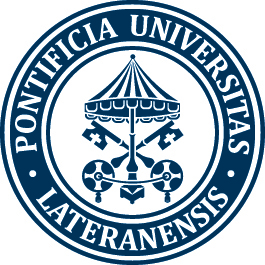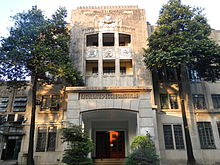For graduate-level theological institutions, the Master of Divinity is the first professional degree of the pastoral profession in North America. It is the most common academic degree in seminaries and divinity schools.
A pontifical university is an ecclesiastical university established or approved directly by the Holy See, composed of three main ecclesiastical faculties and at least one other faculty. These academic institutes deal specifically with Christian revelation and related disciplines, and the Church's mission of spreading the Gospel, as proclaimed in the apostolic constitution Sapientiachristiana. As of 2018, they are governed by the apostolic constitution Veritatis gaudium issued by Pope Francis on 8 December 2017.
Licentiate in Sacred Theology is the second of three ecclesiastical degrees in theology which are conferred by a number of pontifical faculties around the world. The licentiate comes with attendant canonical effects in the Catholic Church, specifically granting the holder the right to teach in Catholic seminaries and schools of theology.
A licentiate is an academic degree present in many countries, representing different educational levels. It may be similar to a master's degree when issued by pontifical universities and other universities in Europe, Latin America, and Syria.
The Doctor of Sacred Theology, also sometimes known as Professor of Sacred Theology, is the final theological degree in the pontifical university system of the Roman Catholic Church, being the ecclesiastical equivalent of the academic Doctor of Theology (ThD) degree.
Divinity is the study of Christian theology and ministry at a school, divinity school, university, or seminary. The term is sometimes a synonym for theology as an academic, speculative pursuit, and sometimes is used for the study of applied theology and ministry to make a distinction between that and academic theology.
The Master of Sacred Theology is a graduate-level, North American, academic degree in theology equivalent to ThM. The Roman Catholic equivalent is the Licentiate in Sacred Theology (STL). An honorary title of STM is also awarded within the Dominican Order.
Doctor of Canon Law is the doctoral-level terminal degree in the studies of canon law of the Roman Catholic Church. It can also be an honorary degree awarded by Anglican colleges. It may also be abbreviated ICD or dr.iur.can., ICDr, DCL, DCnl, DDC, or DCanL. A doctor of both laws is a JUD or UJD.
Licentiate of Canon Law is the title of an advanced graduate degree with canonical effects in the Roman Catholic Church offered by pontifical universities and ecclesiastical faculties of canon law. Licentiate is the title of a person who holds an academic degree called a licence. The licentiate of canon law is the ordinary way for forming future canonists, according to Veritatis gaudium.
The Boston College School of Theology and Ministry (STM) is a Jesuit school of graduate theology at Boston College. It is an ecclesiastical faculty of theology that trains men and women, both lay and religious, for scholarship and service, especially within the Catholic Church.

The Pontifical Lateran University, also known as Lateranum, is a pontifical university based in Rome. The university also hosts the central session of the Pontifical John Paul II Institute for Studies on Marriage and Family. The university is known as "The Pope's University". Its Grand Chancellor is the Vicar General to the Holy Father for the Diocese of Rome. As of 2014 the Pontifical Lateran university had students from more than a hundred countries. It is also sometimes also known as the Pontifical University of Apollinaire.

Antonieto Dumagan Cabajog, often known as Bishop Yiet or Monsignor Yiet, is a Filipino Roman Catholic bishop from Bohol, Philippines, as of 2012 bishop of the Diocese of Surigao.

The University of Santo Tomas is one of the oldest existing universities and holds the oldest extant university charter in the Philippines and in Asia. It was founded on April 28, 1611, by the third Archbishop of Manila, Miguel de Benavides, together with Frs. Domingo de Nieva and Bernardo de Santa Catalina. It was originally conceived as a school to prepare young men for the priesthood. Located Intramuros, it was first called Colegio de Nuestra Señora del Santísimo Rosario and later renamed Colegio de Santo Tomás in memory of Dominican theologian Saint Thomas Aquinas. In 1624, the Colegio was authorized to confer academic degrees in theology, philosophy and arts. On November 20, 1645 Pope Innocent X elevated the college to the rank of a university and in 1680 it was placed under royal patronage.

A pontifical university is a Catholic university established by and directly under the authority of the Holy See. It is licensed to grant academic degrees in sacred faculties, the most important of which are theology, canon law, and philosophy. Pontifical universities follow a European system of degrees in the sacred faculties, granting the baccalaureate, the licentiate, and the doctorate.
An ecclesiastical university is a special type of higher education school recognised by the Canon law of the Catholic Church. It is one of two types of universities recognised, the other type being the Catholic university. Every single ecclesiastical university is a pontifical university, while only a few Catholic universities are pontifical.
Fidel Villarroel was a Spanish historian, writer, filipinologist, biographer, political commentator, Master Theologian of the Dominican Order, and member of the Order of Isabella the Catholic. A recipient of the Pro Ecclesia et Pontifice, he is the former Archivist, Spanish Department Director, Prefect of Libraries, and professor at the Pontifical and Royal University of Santo Tomas. He had also served as secretary to the Apostolic Nunciature for 32 years(1959–1991), and is currently an academic director of the prestigious Academia Filipina de la Lengua Española, the local branch of the renowned Real Academia Española based in Madrid, Spain, and part of the Asociación de Academias de la Lengua Española.
The University of Santo Tomas in Manila, Philippines has 22 colleges and 3 secondary school departments. The colleges are interdependent academic constituents of the university that offer undergraduate and graduate programs. Historically, the colleges are named as Faculty, College, Institute, School, or Conservatory. There are 19 colleges that offer civil courses and 3 faculties that also offer ecclesiastical programs.

Julito Buhisan Cortes is a prelate of the Catholic Church in the Philippines. He is the current Bishop of Dumaguete in Negros Oriental, Philippines since September 2013. Before his appointment to the See of Dumaguete, Cortes was the Auxiliary Bishop of Cebu from 2002 to 2013.

The Catholic University of Madagascar is a private university located in Antananarivo, Madagascar. Founded in 1960 as an institute within the Major Seminary of Antananarivo, it later became an independent institute. It gained accreditation from the Malagasy government in 2000, and in 2011 took its present name.

The San Damaso Ecclesiastical University is a catholic university erected by the Holy See in the Archdiocese of Madrid (Spain). It teaches Philosophy, Theology, Classical Philology, Canon Law and Religion Sciences with official validity in all the universities of the Catholic Church. Its name is taken from the Pope Damasus I.
















